The Internet has become an essential tool for marketing executives globally, where brands that master digital channels are establishing a strong competitive advantage. Meanwhile, China has raised its game by introducing and integrating the new concept of “Internet+”. As China enters a new digital economy, the government is determined to play a leading role in the information technology revolution. But what are the best strategies, technologies and methods that multinational and Chinese companies alike need to succeed in this changing environment? Can these strategies be replicated in other markets?
To address these issues and share best practices, Cheung Kong Graduate School of Business and Millward Brown co-hosted a forum at the Grand Hyatt Pudong in Shanghai, featuring an impressive list of Chief Marketing Officers of leading global and Chinese companies, and attended by hundreds of executives, media and other professionals.
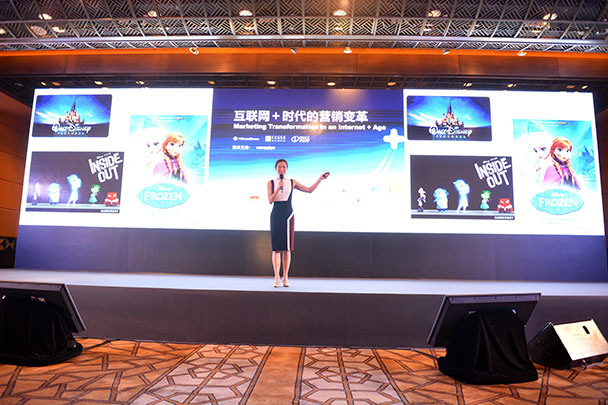
Juliet Zhu, Professor of Marketing at CKGSB, gives a keynote speech
at the Grand Hyatt in Pudong, Shanghai on October 23, 2015.
CKGSB Professor of Marketing Juliet Zhu kicked off proceedings by defining the essence of a brand, describing how a good brand will tell a vivid story, communicated in ways that people can understand, something she said that was especially important in today’s internet age. Prof Zhu cited Disney’s movie franchise as a good example, with films such as Frozen proving massively popular, while Inside Out connects with children on their level, but both also manage to build the brand of the company.
Prof Zhu explained that storytelling is a very effective way for companies to influence their buyers, detailing the science behind this emotional decision. Our brains, she said, work best in understanding stories, because the left side of our brains focuses on logic and understanding, while the right side of the brain hosts our creative faculties. The two sides are complimentary, but Dr Zhu said the creative right side has become more important in today’s world than in the past, citing a quote from cognitive scientist Roger C Schank:
“Humans are not ideally set up to understand logic; they are ideally set up to understand stories.”

Professor Zhu talks to a packed room at the Grand Hyatt in Shanghai.
Prof Zhu also talked about the age of internet stars, with the brands that they represent selling millions of products every year. For example, online models now teach their fans about fashion, and interact with fans, but there is a huge customized merchandising component that should not be ignored. She concluded by saying that anyone who can tell a good story in today’s internet age – and the cost of storytelling online is very low – can have a huge impact on brands.
CKGSB’s co-host, Millward Brown, also released its unique research results from its Insights2020 study, with Millward Brown Vermeer CMO, Marc de Swaan Arons, and the company’s head of Asia Pacific, Africa and the Middle East, Benoit Garbe, both presenting data on marketing challenges, trends and opportunities in China and beyond.
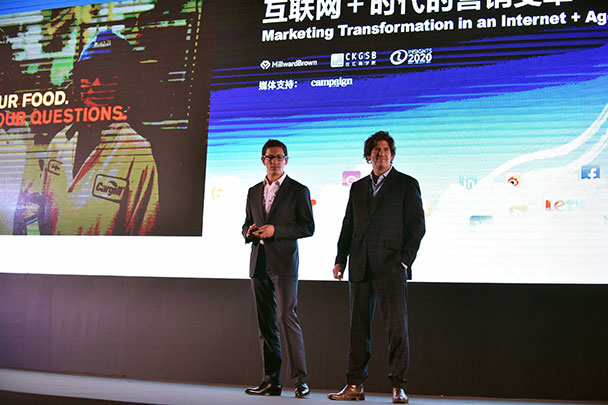
Benoit Garbe (left) and Marc de Swaan Arons from Millward Brown Vermeer
present data from the Insights2020 study
The audience heard how there will be 50 billion connected devices by 2020, marking a huge shift towards customer-centric growth, with Marc listing 10 drivers that made a real difference in this area. These included linking everything to a clear brand purpose, creating experiences based on data driven insights, touch point consistency, ensuring customer centricity is fully embraced by all functions, making customer centricity a priority for leadership, collaborating with customers, embracing risk and experimentation, giving insights and analytics (I&A) a leading role within a company, unlocking the power of data, and using critical capabilities, such as business sense, ‘wholebrain’ thinking and storytelling.
While citing Xiaomi as a great example of a Chinese company that has made customer centricity one of their key pillars, the pair noted that China is lagging behind the rest of the world to some extent when it comes to certain areas, such as prioritizing I&A, but they saw this as a big opportunity for the future. In summary, they advised members of the audience to focus less on products and services, but more on total experience; less on managing risk, and more on experimentation; less on delivering to customers, and more on partnering with them.
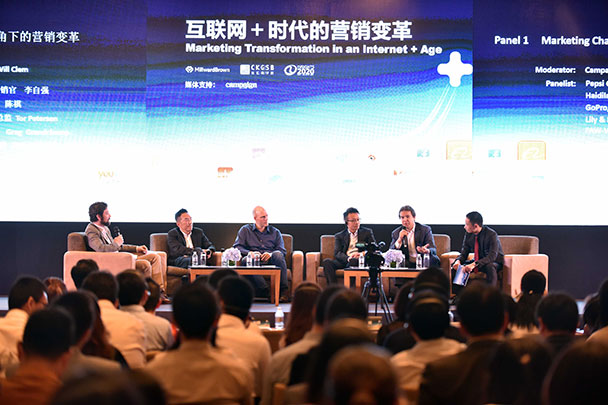
Internet+ Panel (from L to R): Will Clem (moderator), Managing Editor, Campaign Asia; Richard Lee, CMO, Pepsi China; Tor Peterson, Head of APAC Sales & Marketing, GoPro; Qi Chen, Chief Brand Officer, Haidilao; Greg Grandchamp, Vice President, Lily & Beauty; Francis Liu, Director of Strategy & Operations, Audi, FAW-VW
Two fascinating panel discussions followed, with the first focusing on the Chinese government’s ‘Internet+’ strategy. Qi Chen, Chief Brand Officer of Haidilao remarked that the Internet+ campaign allows companies to change their way of thinking and address new challenges. Francis Liu, Director of Strategy & Operations for the Audi Brand at FAW-VW agreed, saying that Internet+ is a mindset change, due to the new power of the internet. As an example, he said how his customers now know 90% of a car’s details before they go to the dealership thanks to online resources, a far higher percentage than in the past.
Tor Peterson, Head of APAC Sales & Marketing at GoPro described Internet+ an ecosystem that scales itself, and snowballs naturally, while Greg Grandchamp, Vice President of Lily & Beauty focused on ecommerce, describing it is a real media channel in its own right, not purely a sales channel. Hype around products, he said, today often comes directly from ecommerce platforms, not just from the media.
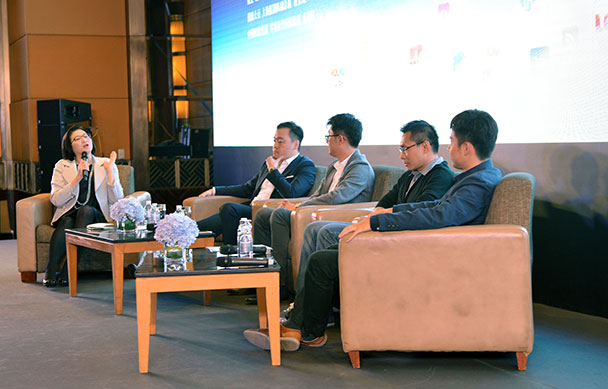
Big Data Panel (from L to R): Joanna Lei, Head of Research, Chung Hua 21st Century Think Tank (moderator); Anthony Tsang, President of Retail Social Applications, Smartac China; Tate Wang, CEO, YHOUSE; Lionel Du, Vice President of Big Data, Youku; Johnson Jing, Senior Marketing Director, VIP.com
The second panel focused on one of the hottest topics in today’s marketing world, big data. Lionel Du, Vice President of Big Data at Youku, described two examples where big data had played a leading role. The instant messaging service he worked on at a previous company was in decline and focus groups and surveys had been unable to solve the issue. But big data demonstrated that at least 10 friends were needed in a small messaging circle for everyone to stay involved, and so they were able to provide the marketing department with real, achievable targets and the overall number of users soon shot up. At Youku, Du explained how a delicate balance of weather conditions affects how many people stay home and watch videos online versus going out, something that is proving to be very useful for the company.
Johnson Jing, Senior Marketing Director at VIP.com said that real-time purchasing data is very important for the company and has become very valuable for the sales and marketing teams. Meanwhile, Tate Wang, CEO of YHOUSE and a CKGSB alumnus, said that mobile technology has to solve the needs of the consumers – citing examples such as Airbnb and Uber – but a tool can be easily copied, so you need to have a community. He added that China is leading the way when it comes to mobile technology, with many international companies trying to learn from China in this area.
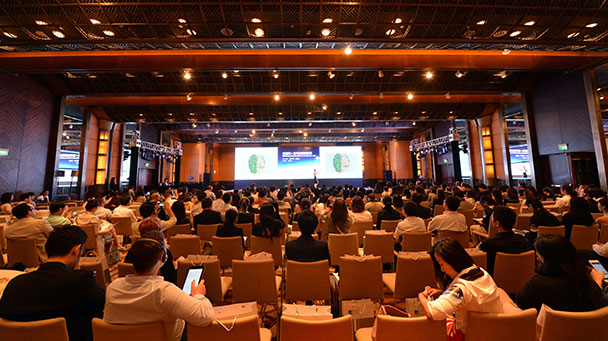
Hundreds of senior executives, members of the media and other professionals attended the event.
Anthony Tsang, President of Retail Social Applications, Smartac China had the last word on the issue when he said that the problem with big data is the word “big”, adding that obtaining quality data is the key. He finished by saying that if brands use big data correctly, the word “sell” will be replaced in the marketing sphere by the word “influence”.